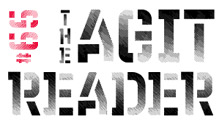
Southpaw, Brooklyn, September 13
by Stephen Slaybaugh
Admittedly, it hasn’t been too long since I’ve last professed my unwavering admiration of the Feelies and their demiurgic catalog of songs (here and here), but with the band’s recent reunion seemingly as unforeseen as it was unlikely, there’s no reason not to bask in every minute of it. Indeed, perhaps the greatest pleasure of moving to New York from Columbus last year has been being witness to the Feelies’ rebirth.
Fresh from playing their debut, Crazy Rhythms, as a whole for All Tomorrow’s Parties on Friday, the Feelies were in Brooklyn to play two sets at Southpaw, just as they had done this summer for a couple nights at Maxwell’s, their old haunt in Hoboken. As it ended up, this night’s show was much like the Maxwell's show I had seen on the Fourth of July, only with one less encore. They began slowly, with “When Company Comes” from the recently reissued The Good Earth and a cover of Jonathan Richman’s “Egyptian Reggae.” Getting warmed up didn’t necessarily mean warming to the crowd still filtering in. Aside from a few “thank you’s” and a couple comments from bassist Brenda Sauter, the band generally went about plying its trade, not necessarily awkward in its stage presence (though a little), but seemingly unconcerned with ingratiatingly itself with the audience. It increasingly mattered little, as the band’s rich blend of Velveteen jangle and rhythmic interplay filled in for any lack of social niceties.
In addition to several more cuts from The Good Earth (“The High Road,” “On the Roof” and “Let’s Go”), as well as “The Undertow” (from Only Life), “Invitation” (from Time for a Witness) and a cover of the Velvet Underground’s “Sunday Morning,” the first set included a couple of new songs. Both fell in line with their template, and the first, with its refrain of “Don’t wait too long” could be construed as an edict from lead singer and guitarist Glenn Mercer to songwriting partner Bill Million, the guitarist whose move to Florida instigated the band dissolving.
The Feelies’ second set was more lively, beginning with Neil Young’s “Barstool Blues” and climaxing franticly with “Too Far Gone,” “Raised Eyebrows” and “Crazy Rhythms.” Mercer and Million barely traded glances, but their guitar lines crisscrossed at breakneck speed. Neither the crowd nor the band seemed satisfied, and an encore of “Doin’ It Again” and REM’s “Carnival of Sorts (Box Car)” came soon after. The band exited and returned four more times, essentially playing a third set in twos. Included were runs through “Moscow Nights,” the Modern Lovers’ “I Wanna Sleep in Your Arms” (included as a downloadable extra live track on the recent Crazy Rhythms reissue), and a final finale of “She Said, She Said,” the Beatles cover they originally did for the No One Knows EP. It added up to more than two hours of music in three hours time. Perhaps such epic shows are an attempt to make up for lost years, but whatever the motivation, there’s no reason to want the Feelies to ever stop—each night or ever.

Death By Audio, Brooklyn, September 14
by Stephen Slaybaugh
In recent weeks, Williamsburg’s Death By Audio was converted from a barebones performance space into a labyrinth accented by mildly grotesque sculptural pieces. It would seemingly not be the ideal set-up for the DIY shows the under-the-radar venue regularly stages, but the place and the bands it’s curated aren’t entirely conventional either. As such, Monday’s event turned out to be more than just another night of standing and staring at people with guitars. Instead, it was more a game of hide-and-seek, as the audience had to still make an effort to seek out each act even after passing through DBA’s nondescript door.
First up in the Maze, as the space/series is being called, was City Center, a new project from Fred Thomas (Saturday Looks Good to Me) and Ryan Howard, who had hidden themselves in a closet. Hard to know what was being heard sight unseen, but a blend of oscillating electronics and guitar nodes wafted from where they had buried themselves. On the divided main stage, and with amps placed out somewhere in the maze, Desolation Wilderness made due without a drummer who had apparently abandoned the rest of them after falling in love out on the road. The minimal beats proved to be ample rhythm as the real focus was the lysergic guitar washes that color the band’s songs. Playing mostly cuts from their recently released New Universe, the trio’s fuzzy creations took on different ambiances as one moved around the room, but remained ever impressive.
Depending on your perspective, the maze has one of two ends: the venue’s bar or inner space. It was on the floor of the latter that Arrington de Dionyso set up with a projectionist to perform. Surprisingly rather than do songs from his new album, Malaikat dan Singa, which is largely reminiscent of his work with Old Time Relijun, he performed in the Tuvan throatsinging style that he’d been exploring on previous records. Think of the sound of someone playing a didgeridoo but without it, and you begin to imagine what this what like. Though he also played bass clarinet, it was when he utilized a jaw harp that the show peaked, a reverberation that was more than mere curiosity. Calvin Johnson followed, back again on the main stage, but his acoustic songs of rock and woe seemed one-dimensional by comparison.
Vivian Girls Live Review
That Summertime Sound
The Breeders Live Review
Dan Deacon/Deerhunter/
No Age and Gang Gang Dance Live Reviews
Björk, Voltaic
A Cultural Dictionary of Punk
Pitchfork Music Fest 09 Wrap-Up
Man Man Live Review
Scott Walker: 30 Century Man
Michael Jackson 1958–2009
Robin Trower Live Review
Isis Live Review
Depeche Mode, The Dark Progression
Yeah Yeah Yeahs Live Review
